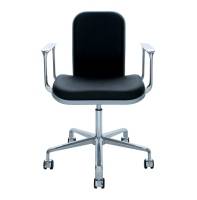September 22, 2014
Winners of Design Guild Mark for 2014 announced by The Furniture Makers Company
 The Furniture Makers’ Company used last week’s 100% Design show to announce the Design Guild Mark award recipients for this year. The Design Guild Mark, now in its seventh year since launching in 2008, rewards excellence in the design of furniture in volume production. According to the organisers, with the award of this Guild Mark for designs which meet The Furniture Makers’ Company criteria, the designers receive due recognition and the industry is made more aware of the importance of investment in design. The Design Guild Mark aims to acknowledge the work of the finest furniture designers working in volume production and the best of British furniture designers working abroad. This year’s winners include Pearson Lloyd’s RIYA task chair for Bene and a posthumous award for the classic Supporto Chair (above), designed by the late Frederick Scott and now manufactured by Zoeftig.
The Furniture Makers’ Company used last week’s 100% Design show to announce the Design Guild Mark award recipients for this year. The Design Guild Mark, now in its seventh year since launching in 2008, rewards excellence in the design of furniture in volume production. According to the organisers, with the award of this Guild Mark for designs which meet The Furniture Makers’ Company criteria, the designers receive due recognition and the industry is made more aware of the importance of investment in design. The Design Guild Mark aims to acknowledge the work of the finest furniture designers working in volume production and the best of British furniture designers working abroad. This year’s winners include Pearson Lloyd’s RIYA task chair for Bene and a posthumous award for the classic Supporto Chair (above), designed by the late Frederick Scott and now manufactured by Zoeftig.











 Avanta Serviced Office Group has signed a deal to establish a new business centre in the heart of London’s Tech City at The Eagle, a 27 storey art-deco-style development on City Road, EC1, from Mount Anvil – Central London’s specialist residential-led developer. The centre is set to open on the 1st March 2015. The new centre will provide over 26,000 square feet of flexible office space over two floors, with approximately 400 desks. Set within a mixed-use development comprising retail, affordable accommodation, offices and high-end residential, it is located within TFL’s Zone 1, approximately five minutes’ walk from Old Street Rail and Underground Station, just two stops from Kings Cross.bThis is Avanta’s first site within Tech City, also known as Silicon Roundabout, which is the third largest technology start-up cluster in the world and home to over 15,000 growing businesses.
Avanta Serviced Office Group has signed a deal to establish a new business centre in the heart of London’s Tech City at The Eagle, a 27 storey art-deco-style development on City Road, EC1, from Mount Anvil – Central London’s specialist residential-led developer. The centre is set to open on the 1st March 2015. The new centre will provide over 26,000 square feet of flexible office space over two floors, with approximately 400 desks. Set within a mixed-use development comprising retail, affordable accommodation, offices and high-end residential, it is located within TFL’s Zone 1, approximately five minutes’ walk from Old Street Rail and Underground Station, just two stops from Kings Cross.bThis is Avanta’s first site within Tech City, also known as Silicon Roundabout, which is the third largest technology start-up cluster in the world and home to over 15,000 growing businesses.













September 16, 2014
The culture of presenteeism is not all just fun and games
by Mark Eltringham • Comment, Flexible working, Workplace, Workplace design
(more…)